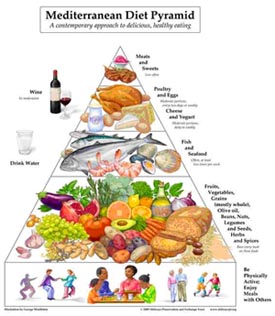In simplified terms, the traditional Greek diet relies on:
# high consumption of olive oil, which in Greece, more than
in any other country, is extra-virgin;
# high consumption of vegetables, legumes, fruits, and
unrefined cereals;
preference of fish over meat;
# emphasis on feta cheese and yogurt, rather than other
dairy products.
# Moderate consumption of wine, mostly during meals.
The health-promoting properties of this diet have been
documented in many populations, and in different historical periods. In the
late 1960s, the original work of Ansell Keys (a distinguished American scientist
who studied the influence of diet on health) on the Greek population gave
credence to the notion that the traditional Greek diet represents a
distinguished prototype of the traditional Mediterranean diet.
The traditional Greek diet has been found to increase
longevity and to protect from serious diseases, such as coronary heart disease
and several forms of cancer. See more here.
